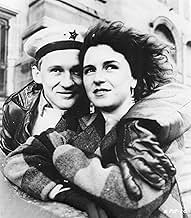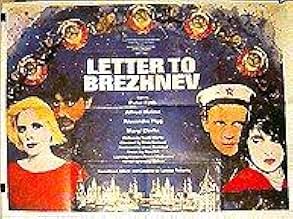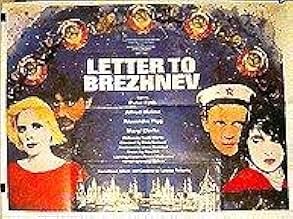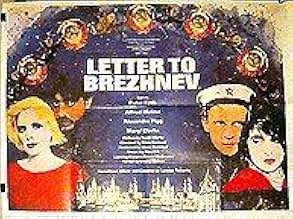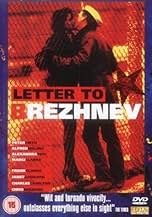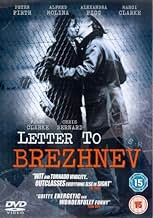PUNTUACIÓN EN IMDb
6,7/10
1,7 mil
TU PUNTUACIÓN
Añade un argumento en tu idiomaTwo Soviet sailors meet Liverpool girls during a shore leave. Peter falls for Elaine but must leave with his ship. Missing him, she writes to Brezhnev hoping to reunite.Two Soviet sailors meet Liverpool girls during a shore leave. Peter falls for Elaine but must leave with his ship. Missing him, she writes to Brezhnev hoping to reunite.Two Soviet sailors meet Liverpool girls during a shore leave. Peter falls for Elaine but must leave with his ship. Missing him, she writes to Brezhnev hoping to reunite.
- Nominado a 1 premio BAFTA
- 2 premios y 1 nominación en total
Tracy Marshak-Nash
- Tracy
- (as Tracy Lea)
Reseñas destacadas
A multifaceted film about two English working class girls (Teresa and Elaine) and two Russian sailors (Peter and Sergei).
In the first half two couples spent a night together. Teresa and Sergei go for the plain vanilla one night stand. Elaine and Peter keep it Platonic, but in so doing get to know each other much better. After all it is Elaine who has the hardest time when the sailors have to get back on board again.
The second half revolves around the relationship of the two friends Elaine and Teresa. This relationship has much in common with the relationship between Elin and Agnes in "Show me love" (1998, Lukas Moodysson). Teresa (Elin) does have the bigger mouth, but Elaine (Agnes) is the one with more guts.
Between the lines the second half is also a little bit of a political satire. There are more films in which romances are disturbed by "big politics" ("The unbearable lightness of being", 1988, Philip Kaufman), but a romance resulting in a girl contemplating an emigration to the Soviet Union is quite new.
In this respect the film is very characteristic of the 80s. The Cold war was passed his prime, in fact (with hinsight) the Soviet Union was nearly dead. On the other hand in England it was the time of the Thatcher years with budget cuts that did hit the Northern part of England (the movie plays in Liverpool) disproportionately hard.
Just like in "Show me love" there is one scene in "Letter to Brezhnev" that is very characteristic of the relation between the two friends. In "Show me love" the relation between Elin and Agnes is defined in the "toilet scene". In "Letter to Brezhnev" the bar scene is equally important. On a given moment Elaine is captivated by doubt if she should go to Russia. She goes outside to make up her mind. When she comes back she orders two wodka's for Teresa and herself. She has made a decision!
In the first half two couples spent a night together. Teresa and Sergei go for the plain vanilla one night stand. Elaine and Peter keep it Platonic, but in so doing get to know each other much better. After all it is Elaine who has the hardest time when the sailors have to get back on board again.
The second half revolves around the relationship of the two friends Elaine and Teresa. This relationship has much in common with the relationship between Elin and Agnes in "Show me love" (1998, Lukas Moodysson). Teresa (Elin) does have the bigger mouth, but Elaine (Agnes) is the one with more guts.
Between the lines the second half is also a little bit of a political satire. There are more films in which romances are disturbed by "big politics" ("The unbearable lightness of being", 1988, Philip Kaufman), but a romance resulting in a girl contemplating an emigration to the Soviet Union is quite new.
In this respect the film is very characteristic of the 80s. The Cold war was passed his prime, in fact (with hinsight) the Soviet Union was nearly dead. On the other hand in England it was the time of the Thatcher years with budget cuts that did hit the Northern part of England (the movie plays in Liverpool) disproportionately hard.
Just like in "Show me love" there is one scene in "Letter to Brezhnev" that is very characteristic of the relation between the two friends. In "Show me love" the relation between Elin and Agnes is defined in the "toilet scene". In "Letter to Brezhnev" the bar scene is equally important. On a given moment Elaine is captivated by doubt if she should go to Russia. She goes outside to make up her mind. When she comes back she orders two wodka's for Teresa and herself. She has made a decision!
Taking place during the 'Cold War' the film describes two people falling in love during a time of massive unemployment and recession in the U.K. The main characters are Elaine and Theresa, two friends who are very different from each other. Elaine is unemployed, bored of her own life and the people around her. Theresa works in a chicken factory and is the opposite of Elaine – she tries to enjoy life, in her own way which involves drinking, having casual sex and taking opportunities when they arise. Elaine and Theresa meet two Russian sailors in a nightclub and Elaine falls in love with the shyer one – Peter – and after he gets back on his ship she decides to go to Communist Russia to be with him, but it doesn't seem so easy to do. In the 1980's there was a big difference between the countries on either side of the 'Iron Curtain'. There was seen to be more freedom in the Capitalist West than the Communist East.
The film shows the negative side of the lives of independent, 'free' women in the West; it tries to show that life in the West at that time was not what we are led to believe. Although we do not see life in Russia in the film, we are told there is work for all people there. For Elaine, Russia represents a happy life, a new start and hope for a job and a family. The film also shows the attitudes of the British to Russia, where they say there is no freedom and that Elaine may lose the opportunity to come back to her country. In my opinion, this film is propaganda for Russia as the director shows us the way that the British government constructed their own propaganda against Russia. Throughout the film the director shows us why life in the U.K. is no better, or may be worse, than life in Russia. We don't know if Elaine will be happier in Russia but she will have followed her heart and dreams.
The film shows the negative side of the lives of independent, 'free' women in the West; it tries to show that life in the West at that time was not what we are led to believe. Although we do not see life in Russia in the film, we are told there is work for all people there. For Elaine, Russia represents a happy life, a new start and hope for a job and a family. The film also shows the attitudes of the British to Russia, where they say there is no freedom and that Elaine may lose the opportunity to come back to her country. In my opinion, this film is propaganda for Russia as the director shows us the way that the British government constructed their own propaganda against Russia. Throughout the film the director shows us why life in the U.K. is no better, or may be worse, than life in Russia. We don't know if Elaine will be happier in Russia but she will have followed her heart and dreams.
Frank Clarke is my favourite writer of British Films (Letter To Brezhnev, Blonde Fist, and I have just found out The Fruit Machine.) The film is set in Modern day working class Liverpool, where two friends Teresa (the one and only Margi Clarke) and Elaine (Alexandra Pigg) hit the town one night and meet two Russian Sailors. Elaine falls head over heels in love and when the sailors set sail Elaine writes a letter to president Brezhnev of Russia regarding her love and the need to see him again as she believes she is being prevented by the British authorities. It is not however a soppy love story, fast paced and again quite true to working class life in Britain in the 1980's. A Film Four production again, who have made the best low budget British Films of the last twenty years.
Margi Clarke is on smashing form here as the gobby Liverpudlian lass ("Teresa") who, together with her pal "Elaine" (a strong performance from Alexandra Pigg), is out on the town hoping to fleece some well heeled punters. They are doing ok on that front - even if they have to do quite a bit of running - when they encounter "Peter" (Peter Firth) and his mate "Andrei" (Alfred Molina) who have a night of shore leave from their Soviet ship. "Teresa" and "Peter" immediately click and after their few hours together, sans sex, they declare their undying love and determination to meet again. How might this happen, though? They are thousands of miles apart and she hasn't tuppence to rub together. Her plan: write to President Brezhnev. His reply: an invitation to visit and a plane ticket. Can she go, will she go, is it all just a daft pipe dream? Whether they do or not is actually quite incidental to the story. It's a whirlwind romance presented to us in a whirlwind fashion that just oozes character. Firth isn't the most versatile of actors, he is a bit one-gear I think, but here that serves as the perfect foil for the brassy, sassy Clarke who provides for an entertaining persona that us Celts can appreciate easily. It's dated, sure, but somehow this love story with a bottle of vodka thrown in still works fine.
Theresa and Elaine are out on the town, they bump into two Soviet sailors Sergei and Peter. After spending the night together, Teresa spends a wild night with Sergei, whereas Elaine and Peter form a much deeper attachment. Unfortunately for Peter and Elaine, their ship is only docked in Liverpool for one night.
I have to start by saying I utterly love this film, it is totally enchanting, it's moving, funny, wonderfully poignant, and gives a window to 1985, culturally and politically.
The music is fabulous, very eighties, but wonderfully in keeping with the tone and emotion of the film. The acting is glorious, Margi Clarke and Alexandra Pigg are sensational.
Liverpool makes a fabulous backdrop, it looks amazing, particularly on the ferry crossing. It does help that I love the place. This film deserves to be a lot bigger and hold cult status.
Superb 10/10
I have to start by saying I utterly love this film, it is totally enchanting, it's moving, funny, wonderfully poignant, and gives a window to 1985, culturally and politically.
The music is fabulous, very eighties, but wonderfully in keeping with the tone and emotion of the film. The acting is glorious, Margi Clarke and Alexandra Pigg are sensational.
Liverpool makes a fabulous backdrop, it looks amazing, particularly on the ferry crossing. It does help that I love the place. This film deserves to be a lot bigger and hold cult status.
Superb 10/10
¿Sabías que...?
- CuriosidadesAlexandra Pigg and Peter Firth are married in real life.
- PifiasElaine says the British embassy did nothing to help her. It is highly unlikely that that she as a British citizen in Britain would have contacted any British embassy, all of which would, by definition, be in other countries. She would have contacted the Foreign Office, which is the authority dealing with foreign affairs and international matters in Britain. The casual viewer might easily confuse the two, but Elaine, who has recently dealt with them, would not make this mistake.
- Créditos adicionalesThe end credits roll to the background of a painted Moscow city landscape.
- ConexionesFeatured in At the Movies: Desert Hearts/Mona Lisa/Letter to Brezhnev (1986)
- Banda sonoraAlways Something There To Remind Me
Written by Burt Bacharach and Hal David
Performed by Sandie Shaw
(uncredited)
Selecciones populares
Inicia sesión para calificar y añadir a tu lista para recibir recomendaciones personalizadas
- How long is Letter to Brezhnev?Con tecnología de Alexa
Detalles
- Fecha de lanzamiento
- País de origen
- Idioma
- Títulos en diferentes países
- Letter to Brezhnev
- Localizaciones del rodaje
- Empresas productoras
- Ver más compañías en los créditos en IMDbPro
Taquilla
- Presupuesto
- 400.000 GBP (estimación)
Contribuir a esta página
Sugerir un cambio o añadir el contenido que falta


